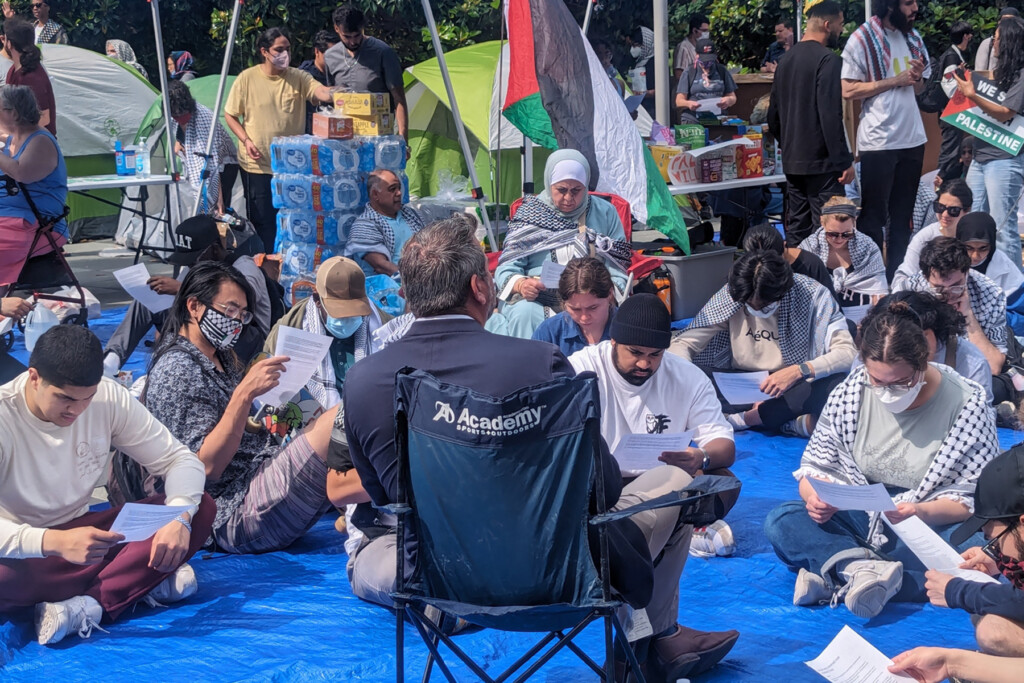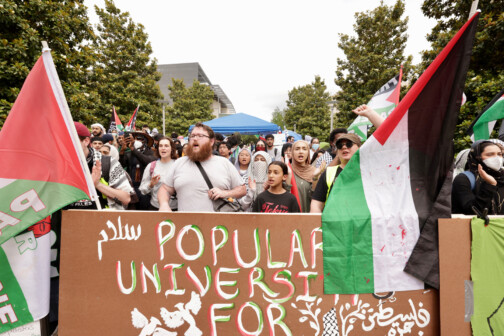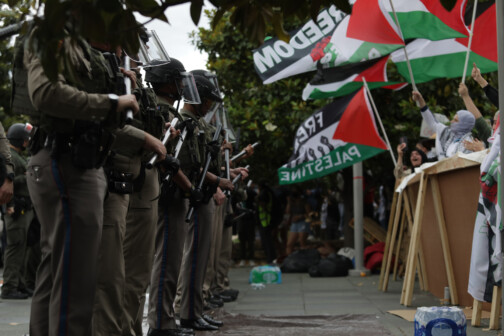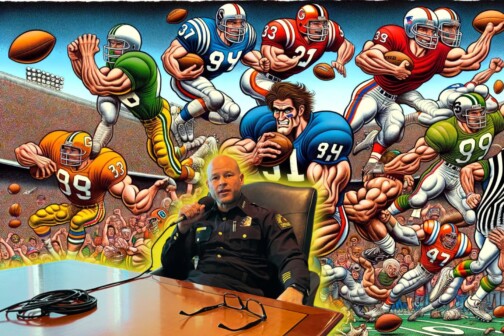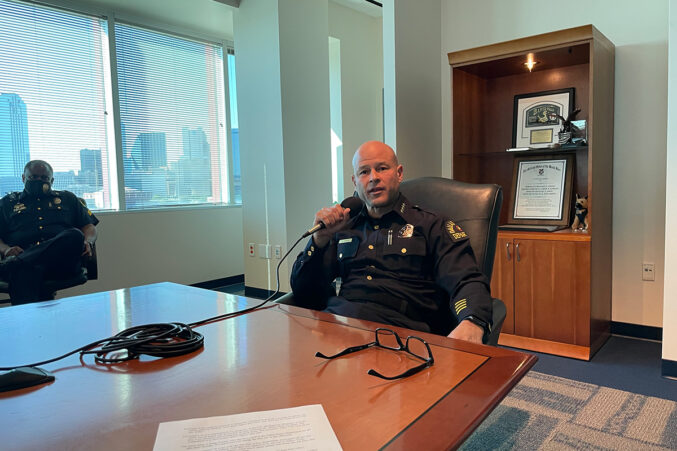A little before 11 a.m. Wednesday, Ben Wright sat in an Academy camping chair on top of a blue tarp and read. A couple dozen students surrounded the history professor inside the Liberated Zone, known most days as Chess Plaza, at the University of Texas at Dallas. Wright’s speciality is abolition studies, and the Liberated Zone is what the protesters named their short-lived encampment at the intersection of two main campus thoroughfares. Wright led a read-in with students who, like others across the country, had gathered to demand their university divest any assets from companies that profit off the war in Gaza.
“We’re reading an article about the destruction of universities in Gaza,” Wright said.
Six hours later, Wright was arrested with at least 18 others, mostly students, as a throng of law enforcement officers from five different agencies, including an Allen PD SWAT team, dismantled and disposed of barricades and tents that made up the Liberated Zone. Three history professors were among the arrestees who were held overnight at the Collin County Jail. Each was charged with criminal trespassing. Wright could not be reached for comment on Thursday morning because he was still in custody waiting to see a judge.
The protesters who filled the encampment at UT Dallas did not commit an act of violence, express any hate speech, or destroy property. The group of students, faculty, and community members chose to deliberately occupy a public space on a public university campus as many social movements have done throughout American history, an action deemed a step too far in the eyes of the university and authorities.
“I am Jewish,” said Miles Iola, a Dallas resident who joined students at the UT Dallas protest. “And I’m here because I support the voices of individuals who are being oppressed regardless of ethnicity or creed. There are Jewish voices on campus who agree with us and organize for the same purposes. So I want to nip in the bud the idea that this movement exists to disenfranchise Jews from campus.”
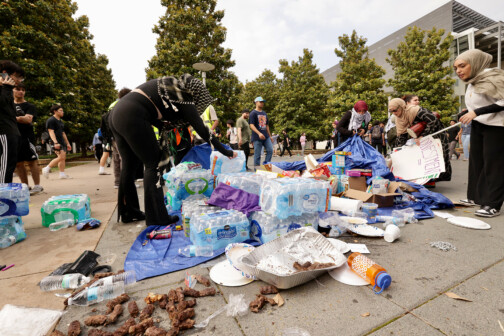
Law enforcement officers from five agencies broke down the makeshift barriers of the encampment and arrested about 20 people on May 1, 2024.
Jason Janik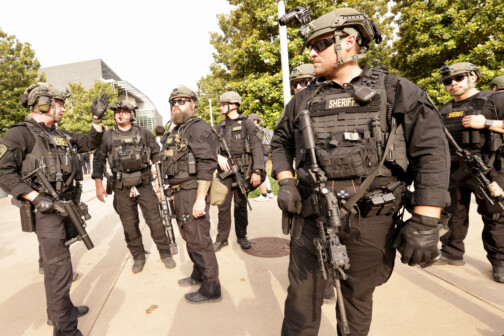
Law enforcement officers from five agencies broke down the makeshift barriers of the encampment and arrested about 20 people on May 1, 2024.
Jason Janik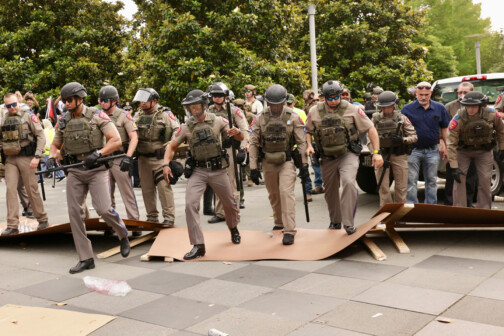
Law enforcement officers from five agencies broke down the makeshift barriers of the encampment and arrested about 20 people on May 1, 2024.
Jason Janik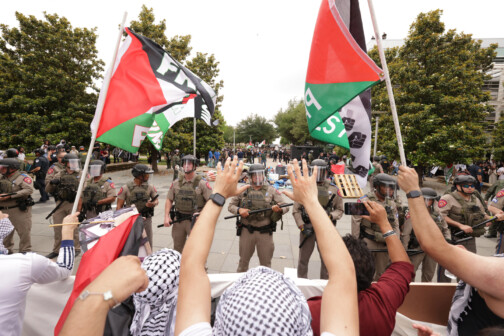
Law enforcement officers from five agencies broke down the makeshift barriers of the encampment and arrested about 20 people on May 1, 2024.
Jason Janik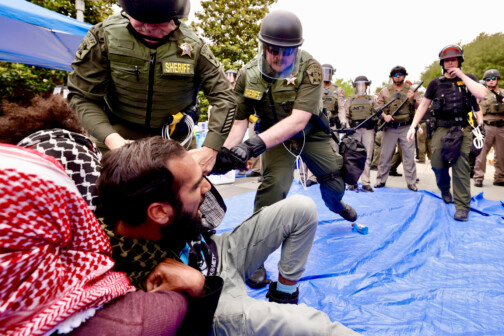
Law enforcement officers from five agencies broke down the makeshift barriers of the encampment and arrested about 20 people on May 1, 2024.
Jason Janik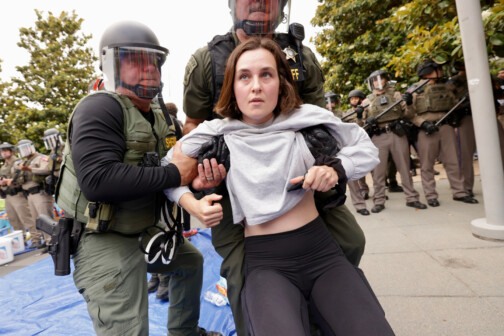
Law enforcement officers from five agencies broke down the makeshift barriers of the encampment and arrested about 20 people on May 1, 2024.
Jason Janik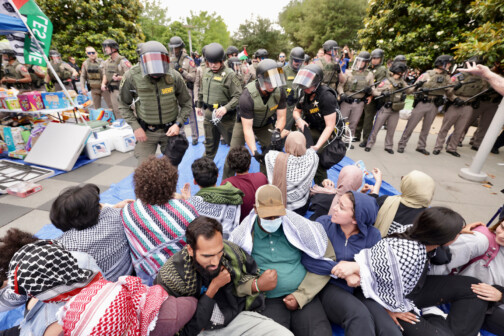
Law enforcement officers from five agencies broke down the makeshift barriers of the encampment and arrested about 20 people on May 1, 2024.
Jason Janik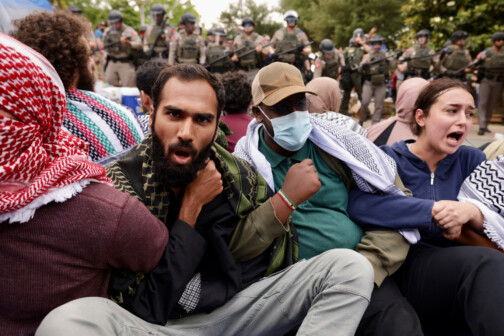
Law enforcement officers from five agencies broke down the makeshift barriers of the encampment and arrested about 20 people on May 1, 2024.
Jason Janik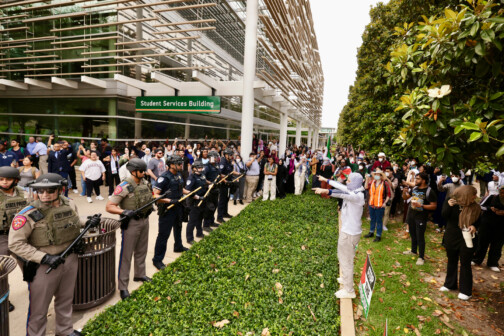
Law enforcement officers from five agencies broke down the makeshift barriers of the encampment and arrested about 20 people on May 1, 2024.
Jason Janik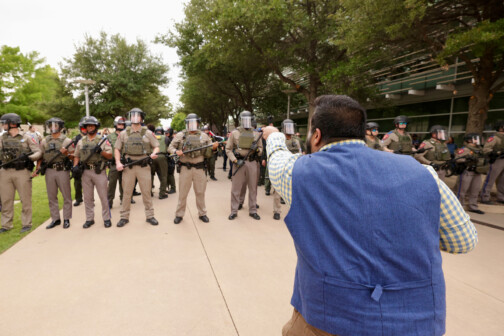
Law enforcement officers from five agencies broke down the makeshift barriers of the encampment and arrested about 20 people on May 1, 2024.
Jason Janik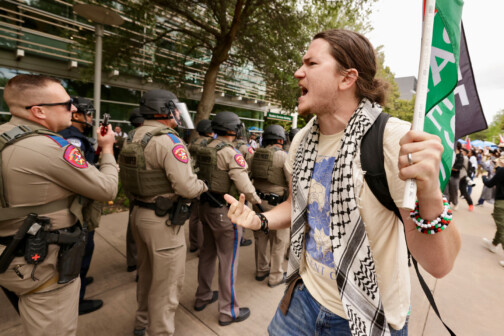
Law enforcement officers from five agencies broke down the makeshift barriers of the encampment and arrested about 20 people on May 1, 2024.
Jason Janik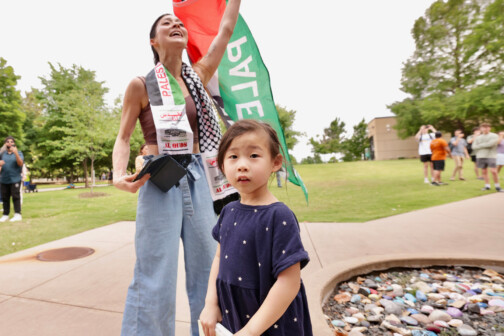
Law enforcement officers from five agencies broke down the makeshift barriers of the encampment and arrested about 20 people on May 1, 2024.
Jason Janik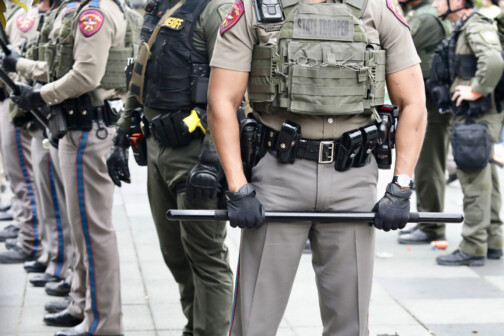
Law enforcement officers from five agencies broke down the makeshift barriers of the encampment and arrested about 20 people on May 1, 2024.
Jason JanikBefore sunrise Wednesday morning, UT Dallas students began establishing their protest camp at Chess Plaza, a part of campus near the Collin County line. The Liberated Zone was fully formed by 10 a.m. Slogans and posters were appended to plywood barricades. Tents were adorned with signs. Food, supplies, and a literature library rested on folding tables. Crowds gathered just outside the camp in solidarity.
The atmosphere was calm at the Liberated Zone for most of the day. In addition to the read-in, student protesters chanted, studied, prayed, and ate lunch. The protest camp didn’t block access to buildings; the only notable disruption was to the path of food delivery robots. UT Dallas issued a statement to the protesters just before 4 p.m.: “individuals may peacefully assemble in the common outdoor areas of campus to exercise their right to free speech, but they may not construct an encampment or block pathways.”
By late afternoon, law enforcement from a variety of departments surrounded the encampment. UT Dallas, Richardson, and Allen police departments all sent officers. The Collin County Sheriff’s Department and Texas Department of Public Safety troopers lined the edge of the encampment.
Police set up an operations center in a conference room overlooking the plaza while helicopters and surveillance drones hovered overhead. Soon, a line of officers, backed by a black military-style armored vehicle courtesy of Allen PD, prepared to move on the camp.
Just before 4 p.m., UT Dallas administrators delivered a letter to the protest organizers that stated, “the setting up of an encampment — including tents, barricades, and other structures — is not permitted under the University’s Policy for Free Speech and Assembly, nor is it permitted under any other University of Texas at Dallas or UT System Policy or Rule.”
Organizers immediately began to warn protesters of an imminent raid and encouraged the elderly, disabled, those with children, and anyone who was unwilling to be arrested to leave the Liberated Zone before it was too late.
Minutes after the UT Dallas administrators delivered the letter, police broke down the barricades and began to arrest anyone who remained in the encampment. Eye witnesses reported no verbal warning from law enforcement before their approach. Most of the protesters backed away as police advanced, but those who remained were arrested, including Wright and two other faculty members. A core group of student activists sat in a circle and linked arms in the face of the advancing police. Officers lifted them up one by one, placed them in zip ties, and marched them off. None resisted arrest. An officer clutching bolt cutters shoved a reporter with Fox 4.
As word spread of the police raid on the UT Dallas Liberated Zone, the protest crowd swelled in size and surrounded the police while officers threw what remained of the encampment into trucks for disposal. “You failed Uvalde,” protesters chanted at a line of baton-wielding State Troopers. Nearby, a small contingent of counter protesters held an Israeli flag, but there were no confrontations.
After the initial arrests and clearing, police did not attempt to disperse the remaining protesters. When the cleanup job was nearly through, organizers urged people to walk away from the police and gather at the student union, where they continued their demonstration for several hours. As the sun began to set, another group of protesters splintered off and went to the Collin County Jail to support those who had been arrested.
Pro-Palestinain protests at UT Dallas in recent weeks did not see this sort of police repression. When students engaged in sit-ins at the administration building on two separate occasions last month, UT Dallas administrators agreed to meet with student organizers to discuss their demands for divestment instead of calling the cops.
Things have changed in recent weeks. Protest encampments have sprung up at universities across the nation, including several in Texas. In 2019, Gov. Greg Abbott signed a law aimed to protect free speech on university campuses. Now five years later, on April 24, Abbott said protesters who organized a larger encampment at UT Austin “belong in jail” and that “students joining in hate-filled, antisemitic protests at any public college or university in Texas should be expelled.” On April 29, 79 pro-Palestinian protesters were arrested at UT Austin. Thursday morning, another encampment popped up at UT Arlington.
“I think they were threatened by the gathering of students that they felt like they couldn’t control,” said Fatima Ahmed, a fourth-year UT Dallas student and organizer with Students for Justice in Palestine. “This was a completely peaceful protest. We were eating lunch, singing, and giving talks throughout the day. We weren’t expecting this. We didn’t think it’d be another UT Austin.”
As of noon Thursday, all of the people arrested the prior afternoon had been arraigned and were gradually being released.
Author



